How to Use Private Internet Access (PIA) VPN in China in 2025
Founded by London Media Trust in 2010, Private Internet Access is a solid VPN with a long-standing reputation. However, getting PIA up and running in China is a little tricky. China’s strict censorship and VPN blocks make it really difficult to get VPNs working there.
PIA’s customer support told me that it’s not guaranteed to work there. My research confirms this; it’s unreliable in China. However, I’ve found a few ways to get PIA to work if you’ve already purchased it.
Quick Guide: How to Use PIA in China in 3 Easy Steps
- Get PIA. You should download and install PIA before arriving in China.
- Connect to a server in or close to China using the WireGuard protocol. Servers closer to you give you better speeds, and WireGuard is one of the fastest VPN protocols.
- Start using PIA for China. You can use the internet privately and without interruptions.
NOTE: Even though PIA’s WireGuard is the most recommended protocol in China, PIA’s customer support told me it may not always work.
Does PIA Work in China?
PIA’s customer service confirmed there is no guarantee that PIA works there due to China’s aggressive blocks. China’s government uses a strong firewall and VPN blocks to regulate domestic internet usage.
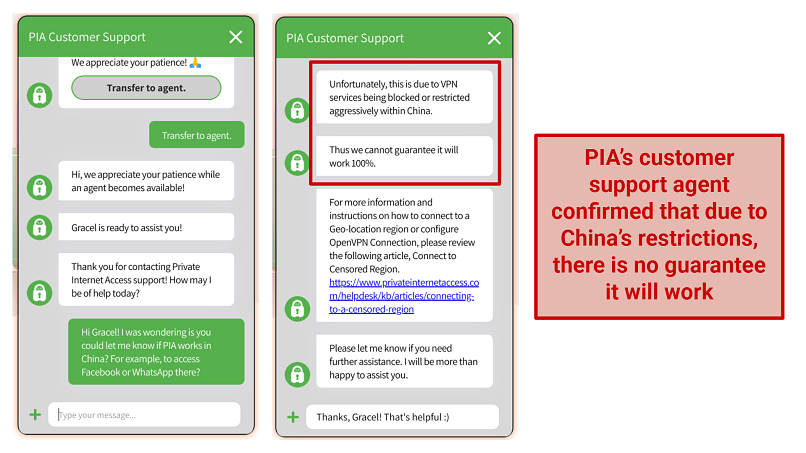 Due to China’s VPN blocks, many VPNs don’t work there
Due to China’s VPN blocks, many VPNs don’t work there
PIA’s FAQ page also explains that it’s unlikely to work in other regions with strong geoblocks or restrictions. High censorship countries work hard to ensure that people can’t use VPNs there.
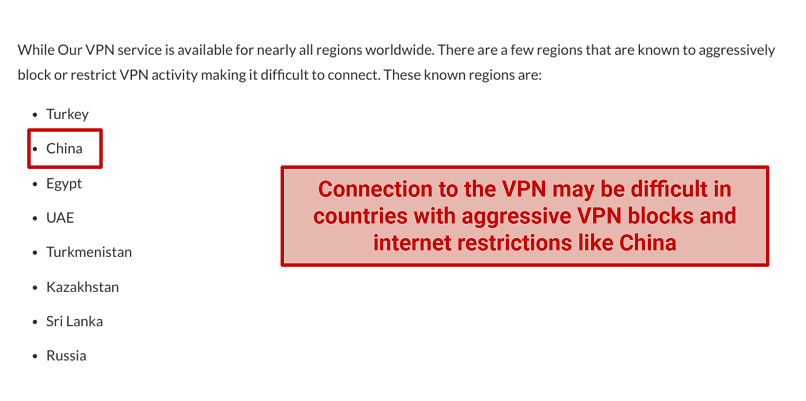 Countries with high censorship block VPN activity
Countries with high censorship block VPN activity
However, some VPNs can safely access websites more reliably than others. VPNs protect you by encrypting your browsing activity, so that no third parties can see what you’re doing online. They are designed to work on restrictive networks and privately access sites like Facebook and YouTube.
To work reliably in China, your VPN needs to use strong obfuscation technology so that the Firewall can’t tell you’re using it. PIA lacks these features, which is why it doesn’t always work in China. However, I have found and tried out some troubleshooting tips that may help you set up PIA to work even in China.
How to Set up PIA in China
Use PIA’s OpenVPN Connection
One of the ways to get PIA to work is by using its OpenVPN connection. It is one of the most commonly used protocols that deliver a stable connection under most circumstances. OpenVPN works by establishing a secure connection between your VPN client and server, making it undetectable and capable of overcoming firewall restrictions.
This is easy to do by selecting it through your Account Settings > Protocols > OpenVPN.
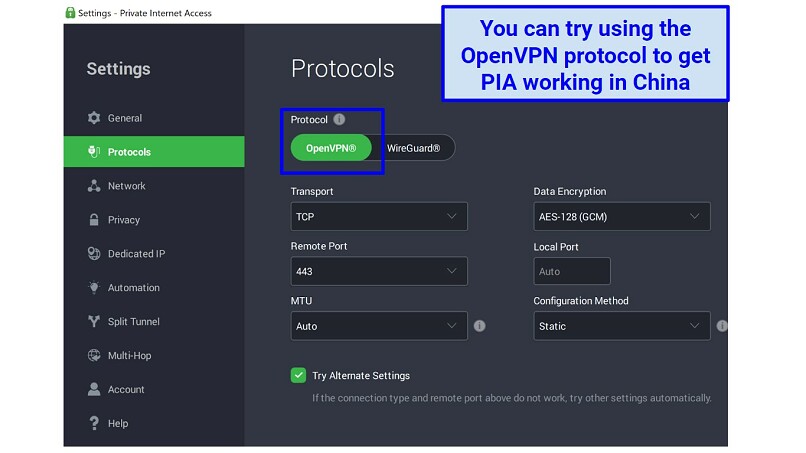 PIA’s OpenVPN protocol may allow you to use it in China
PIA’s OpenVPN protocol may allow you to use it in China
Use PIA’s WireGuard Protocol
PIA’s customer support recommended using the WireGuard protocol, as it’s one of the safest available. It provides a good balance between security and speed, so it’s ideal for use in China. WireGuard’s efficient code base means there are fewer opportunities for leaks.
The WireGuard protocol is easy to use by simply going to your Account Settings > Protocols > WireGuard.
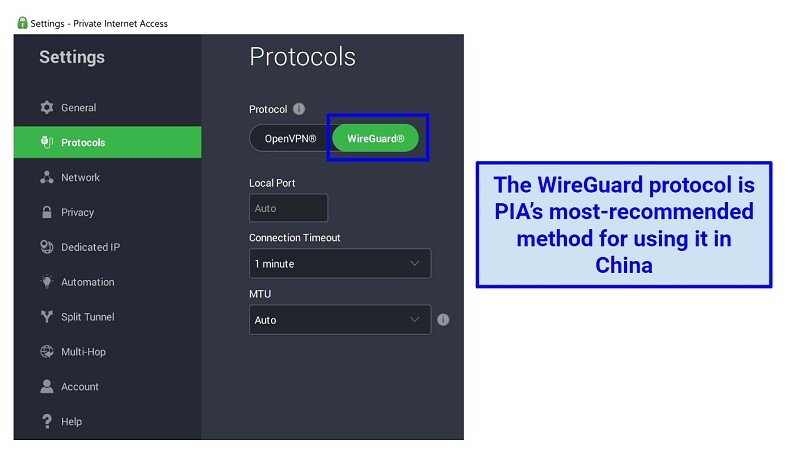 You can enable PIA’s WireGuard protocol to work in China
You can enable PIA’s WireGuard protocol to work in China
Using the OpenVPN Connect App
PIA recommends manual configuration using the OpenVPN Connect app if the OpenVPN and WireGuard protocols haven’t worked.
- Download PIA VPN and the OpenVPN Connect app. You need both to do this.
- Go to the customer control panel in your PIA account.
- Click Go to OpenVPN Generator in PIA’s Settings.
- Find the version of OpenVPN Connect you are using. Search for your chosen platform and select China as the region.
- Select the port. PIA recommends using Port TCP/ 443.
- Pick Use IP and press Generate. Select Download at the pop-up.
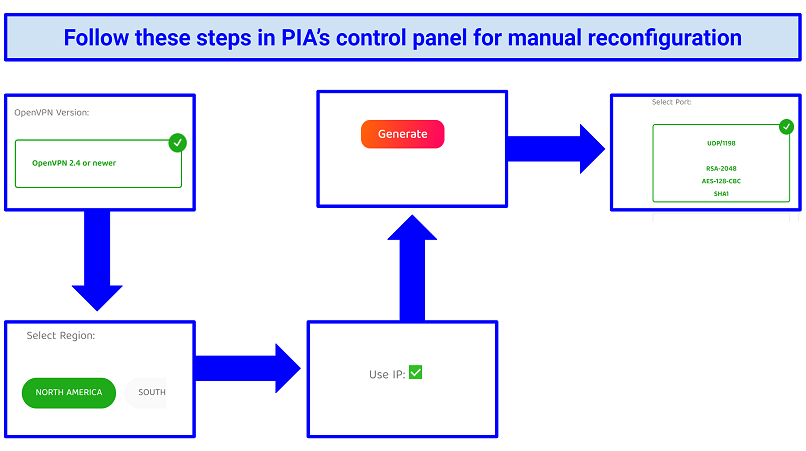 Use manual configuration as the last resort if the OpenVPN or WireGuard protocol doesn’t work
Use manual configuration as the last resort if the OpenVPN or WireGuard protocol doesn’t work
- Import the file to the OpenVPN Connect app. This depends on the device you’re using.
- Start using PIA in China by connecting to your imported file.
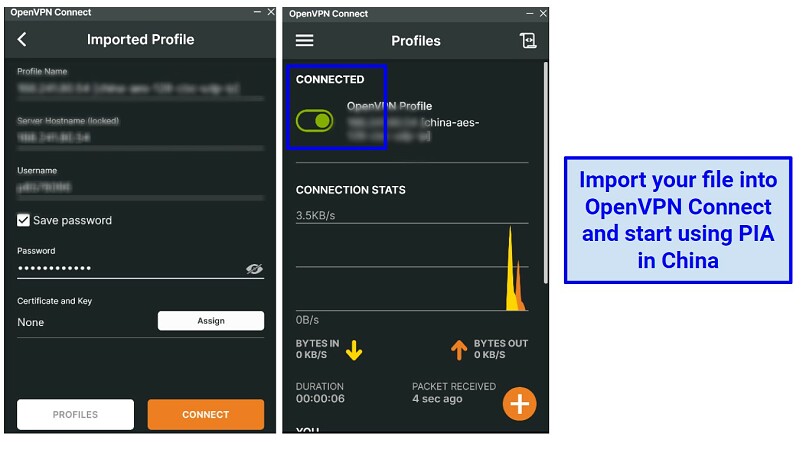 The OpenVPN Connect app lets you configure the files manually to get PIA working in China
The OpenVPN Connect app lets you configure the files manually to get PIA working in China
FAQs on Using a VPN in China
Are VPNs legal in China?
In China, only government-approved VPNs are legal. The country has many laws in place to restrict internet access. However, there are a few VPNs with robust security features that can keep your data private in China.
The country goes after the VPNs rather than the users. There have been no public reports of tourists facing punishment for using a VPN.
My team and I don’t condone using a VPN with illegal intentions. You should always make yourself aware of the laws of the country you’re in.
Can I use a free VPN for China?
Most free VPNs don’t work in China. As free VPNs don’t have obfuscated servers, the Chinese government can easily detect and block them.
The major streaming sites also block free VPNs, and they don’t have the same robust security features as other VPNs. There are only a few free VPNs that are known to work in China more reliably.
What’s important when choosing a VPN to use in China?
When using a VPN in China, there are some really important features you should make sure it has. These are:
- Advanced security features
- Fast speeds
- Ability to safely access content
- Servers in or close to China
- Functioning website in China
- Generous money-back guarantee
- Cryptocurrencies as a payment method
Conclusion
There are a couple of ways to set up PIA in China, but it isn’t guaranteed that those methods will work. However, PIA offers a 30-day money-back guarantee, so there's no financial risk in trying it out.



Please, comment on how to improve this article. Your feedback matters!